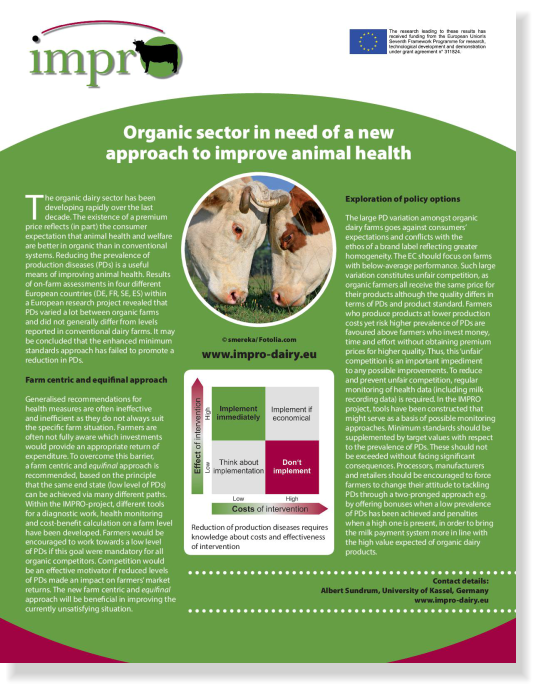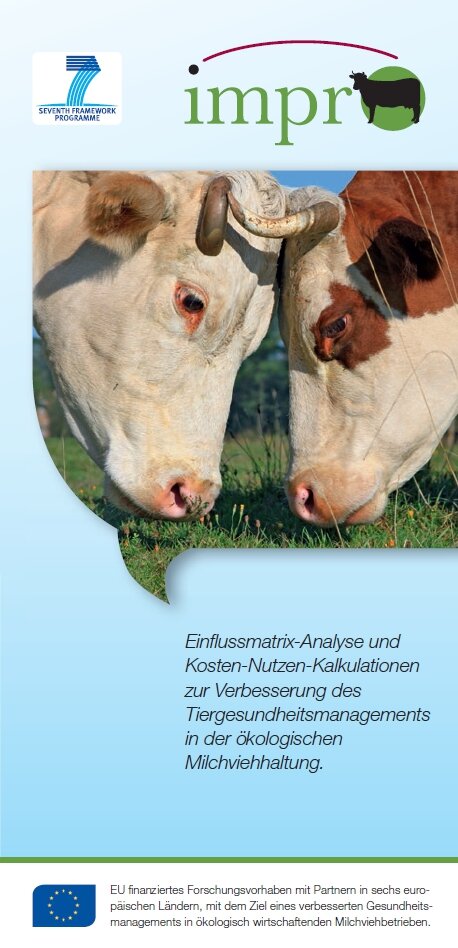Project Summary
Animal health status in organic dairy farming does not in all respects meet consumers’ expectations. Improvements are crucial to support consumers’ confidence and their willingness to pay premium prices. These are needed to cover the higher production costs. Previous herd health planning concepts have prepared the ground for advancements. However, heterogeneous living conditions for farm animals providing invalid generalisation of recommendations or insufficient implementations of measures are counteracting an improvement of the animal health status.
The IMPRO project aims to substantially overcome some weak points in the current health management strategies on organic dairy farms and to increase the implementation of evidence based measures and to improve practice of health management. This will be achieved by a multidisciplinary, participatory, and equifinal approach to develop farm specific solutions regarding preventive measures and early treatment strategies. Researchers, experienced in conducting applied research, will aim for the following:
- to develop a participatory and farm-centric tool for a sound diagnostic procedure at the farm level, identifying the most effective measures to improve animal health,
- to evaluate farm-specific costs and benefits of recommended measures, to optimise farm-specific allocation of available resources, and to emerge incentives,
- to examine the motivation and attitudes of farmer, advisor, and veterinarian directly involved in health management practice,
- to elaborate reference values for achievable standards for the animal health status,
- to develop a pro-active monitoring protocol aiming for improved effectiveness of preventive and treatment strategies and for a reduction in the use of allopathic remedies,
- to assess the manageability of alternative treatments according to the state-of-the-art,
- to develop a software-based tool including health monitoring, farm diagnostics’ procedures, cost-benefit calculation, and break-even analysis.
The envisaged objectives will be achieved within the time period of the project by the development of a tool for the use on the farm level to enable well-directed and accurately fitting strategies to improve management practices (work package [WP] 2, 6). The effectiveness of proactive preventive and early treatment strategies on the herd level will be assessed within the project (WP3). Decision trees for the diagnostic procedure and the use of alternative treatments will be provided as well as results about the manageability of alternative treatments according the state-of-the-art under commercial conditions (WP4). The state of the art on alternative treatments in pig and poultry production, research projects in the field, findings that have been made, the degree of cooperation between institutes and the possibilities to reduce antibiotics will be assessed (WP9). A further outcome will be an overview on the legal and factual prescriptions in relation to the use of alternative treatments in Europe. Calculating the costs needed for the implementation of measures identified as being most effective enables an assessment of the most efficient cost-benefit-relationship to improve incentives for farmers (WP5). The various outcomes of the individual workpackages will be integrated into a beta-version of a validated software-based decision support tool which will function as an operational base to consolidate the gained knowledge and to transfer the scientific and technical advancements into practice, breaking down the comprehensive and complex issue into action in farm specific situations (WP6). The project structure aims at an efficient project management (WP1; WP8), ensuring a widespread and target-group oriented dissemination (WP7).











